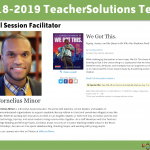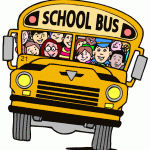Last year our school culture shifted away from “I have to do this.” “I have to teach these kids.” “This is my job, I have to be here.” “I have who, that student.” TO, “I get to do this work.” “I get to work with these students.” “I get to work here.” Don’t get me wrong we still face barriers and challenges just like every school does, but at our school we approach them differently. We look for solutions, opportunities to grow and ways we can change.
We are focusing on the Leader in Me – 5 Core Paradigms:
- Paradigm of Leadership – Everyone can be a leader.
- Paradigm of Potential – Everyone has genius.
- Paradigm of Change – All change starts with me.
- Paradigm of Motivation – Teachers empower students to lead their own learning.
- Paradigm of Education – Develop the whole person.
Knowing last year we had a colossal shift in thinking we looked for ways to sustain that movement and forward trajectory this year. What if we change one word and begin to address our students as scholars?
First, we were mindful to create a common language and define the difference between a student and a scholar. We researched and came up with generic definitions including: A student can be described as a learner especially one enrolled in a school or college whereas a scholar denotes a learned person with profound knowledge of any specific subject. They both can be used to define a person who attends a school or a college. A student can be described as a learner, who usually attains knowledge through teachers whereas a scholar is guided by other scholars of his or her field and also takes immense interest in conducting his studies and research independently.
Next we talked and shared ideas within our grade level teams at a staff meeting. Recognizing before something sticks you have to talk through it and put your thoughts out for others to hear and rephrase and add on to. Through these conversations we were able to brainstorm using thinking map structures to organize our thoughts and develop an understanding of the two terms, more of a working definition that we could share with students and families.
Here is what we came up with…
Students are…
Teacher driven, dependent, uncertain, learners, school member, learns from teacher, has general knowledge, follows, traditional, reads because they have to, novice, inside the box, and passively learns.
Scholars are…
Peer driven, engaged, multi-faceted learner, collaborator, problem solver, self-motivated, passionate, independent, innovative, wants to learn, desires to share knowledge, prestigious, focused, reads to learn, inquisitive, actively learns, advanced, studious, directs instruction, outside the box, pursues knowledge, and asks questions.
Students and Scholars are…
Thinkers, attentive, disciplined, learners, have potential, creative, inspire, achieve, energetic, hard-working, fun, open and engaged.
We will continue to add to and adjust our working definitions through the course of our work this year. We are excited to invite parents and students to share their thoughts around our new thinking.
It is exciting to walk through rooms or down the hallways and hear teachers refer to the kids in their class, the kids at our school as scholars, engaging in conversations around why we made the change and what it means. I can’t wait to see the impact simply changing one word will have on our students scholars, our school, our community.
I invite you to join the conversation and post your thoughts.










Comments 4
Wow. Dr. Robinson. I ABSOLUTELY LOVE THIS!!! I have been referring to my students as scholars for the past two years, and in my mind I knew there was a distinction between students and scholars, but I really never sat down to process my thinking or even articulate to anyone why I started calling my students scholars. Now, I plan on using what you have written here regarding the two terms to have a dialogue with my scholars! Many of my students are “graduates” of the school and they have so many fond memories of the school and staff, especially the principal wink-wink. They are all excited about the possibility of mentoring a group of elementary students this year. Dr. Robinson, the way my scholars speak about their experiences at your school is a testament to the Leader in Me – 5 Core Paradigms, especially “Teachers empower students to lead their own learning,” which is the norm in my classroom and the “graduates” feel very much at home in our classroom community. I look forward to another exciting year-journey- between the two schools and our group of amazing scholars!
wink-wink. They are all excited about the possibility of mentoring a group of elementary students this year. Dr. Robinson, the way my scholars speak about their experiences at your school is a testament to the Leader in Me – 5 Core Paradigms, especially “Teachers empower students to lead their own learning,” which is the norm in my classroom and the “graduates” feel very much at home in our classroom community. I look forward to another exciting year-journey- between the two schools and our group of amazing scholars!
This is such a great shift. I can not wait to see what kind of profound impact this paradigm shift has on the students and on the community. Thank you for sharing this shift with all of us and for being so brave and bold in your school. From experience I know that the community you are building will have a lasting impact on scholars, educators, and families.
What a transformational shift, Jen! Word power! I love the paradigm shifts from the Leader in Me program. It is those shifts in mindset that will empower your scholars, teachers and community to do great things.
Thank you for incorporating the word “scholars” into your learning culture – students really do respond well to it! Once you get it going… try explaining to students that back in the day (think Socrates here) people used to go to school in a garden, sit beneath trees, and engage in discussion just for the sake of learning – and not because the “had” to be there! I bet that, if you dare students to make a crown of Socratic leaves for their heads and encourage them to study books beneath trees on your campus, they’d make something cool and viral out of it. They are scholars after all…